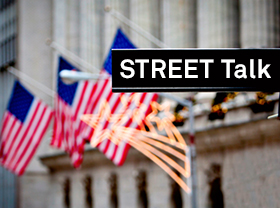Featured Topics
Featured Products
Events
S&P Global Offerings
Featured Topics
Featured Products
Events
S&P Global Offerings
Featured Topics
Featured Products
Events
S&P Global Offerings
Featured Topics
Featured Products
Events
Financial and Market intelligence
Fundamental & Alternative Datasets
Government & Defense
Professional Services
Banking & Capital Markets
Economy & Finance
Energy Transition & Sustainability
Technology & Innovation
Podcasts & Newsletters
Financial and Market intelligence
Fundamental & Alternative Datasets
Government & Defense
Professional Services
Banking & Capital Markets
Economy & Finance
Energy Transition & Sustainability
Technology & Innovation
Podcasts & Newsletters
Research — 4 Apr, 2024
Street Talk" is a podcast hosted by S&P Global Market Intelligence that takes a deep dive into issues facing financial institutions and the investment community.
While the banks that failed in spring 2023 were outliers that violated some of the golden rules of banking, many investors continue to unfairly paint the bank group with a broad brush, according to KBW CEO Tom Michaud.
Bank stocks have recovered from the recent low point sustained in fall 2023, roughly six months after Silicon Valley Bank, Signature Bank, and First Republic Bank failed, but the group still trades at a substantial discount to the broader market. Michaud said in the latest Street Talk podcast, recorded March 12, that investors do not distinguish enough from one bank to another. He instead compared their approach to using a "giant paintbrush that paints the whole industry at the same time."
Michaud said when a problem occurs in the banking industry, all banks are put in the same bucket. Banks were hit by that broad negative sentiment in the aftermath of the liquidity crunch of 2023, even though the three banks that failed had unique characteristics. Michaud said each of those institutions "violated" the golden rules of credit analysis in a variety of ways, including maintaining extensive exposure to a certain industry, holding high levels of uninsured deposits or taking extensive interest rate risk.
"Sometimes I feel as if the ones that got off base become the center of all the conversation. You kind of miss where the majority of the action really is," Michaud said.
That broad brush returned more recently, he noted, when New York Community Bancorp Inc. shares were halted a few weeks ago after news of its recapitalization broke. New York Community shares had faced intense pressure as fears of higher credit costs weighed on the name. Michaud noted that the regional bank index again fell when the New York Community's shares came under fire. He said those moments can create opportunities for investors because they can purchase shares of banks that do not have the same risk. He acknowledged though that the negative view toward the sector could continue until there is more of an "all clear signal" for commercial real estate, but he ultimately believes banks' exposure to CRE will be an earnings issue rather than a safety and soundness concern.
"It's hard because investors are nervous about credit and the only way to prove it wrong is to report your earnings and not have a big credit problem," Michaud said.
The executive emphasized that not all categories of commercial real estate carry the same risk. Large office buildings in urban centers can pose considerable risk since vacancy rates have risen materially since the pandemic. However, larger banks with exposure to that asset class have already recorded sizable reserves against the credits. More banks likely face the challenge of commercial real estate loans made in 2020 and 2021, when interest rates were much lower, looking to refinance at significantly higher rates.
Michaud believes the industry recognizes the potential risk associated with commercial real estate exposures and is taking action to get ahead of problems. He noted that banks are building reserves earlier now than in past economic cycles because the industry adopted a new reserve methodology in recent years, the current expected credit loss model, which requires institutions to employ a more forward-looking approach.
"Bankers know this. They're out in front of it. They're restructuring. They're asking borrowers for more equity. I think, for all those reasons, it could be an earnings issue, but I don't think it's a big solvency issue for the industry," Michaud said. The executive also sees catalysts for bank stocks on the horizon. At some point, he believes the Street will see that the economy will not have a hard landing and earnings estimates for banks will be seen as more reliable. He further noted that the large banks should benefit from a rebound in their investment banking businesses as capital raising and M&A activity returns in force. "Investors have already started positioning themselves for that. If you start to get revenue improvement because the margins get better, noninterest revenue gets better, credit is not falling off the table — if the market believes all that, these stocks are at a discount and they're going to outperform," Michaud said.
 This article was published by S&P Global Market Intelligence and not by S&P Global Ratings, which is a separately managed division of S&P Global.
This article was published by S&P Global Market Intelligence and not by S&P Global Ratings, which is a separately managed division of S&P Global.
